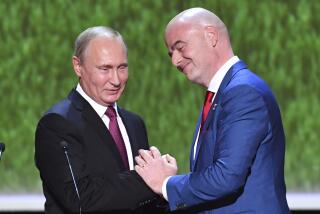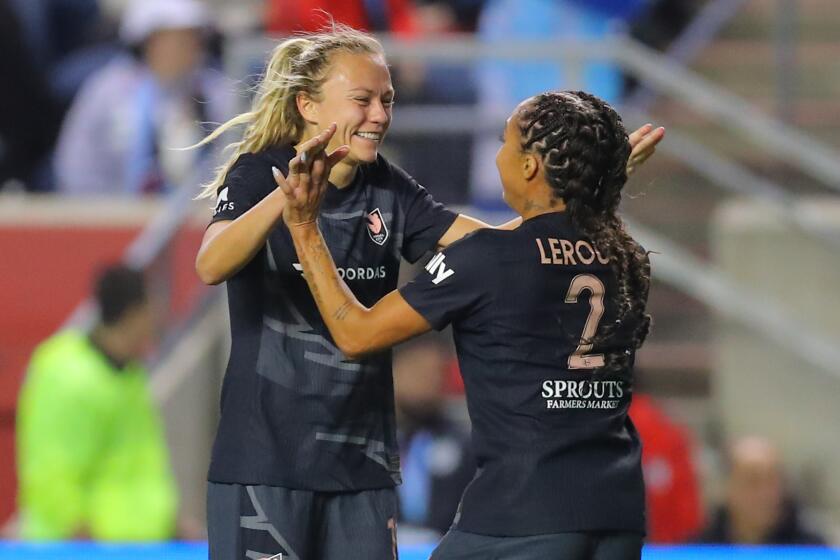World Cup quarterfinals a class conflict between soccer’s rulers and its climbers
There is a prominent square in this central Russian municipality dedicated to the revolutionary writer Maxim Gorky, for whom the city was once named.
For much of the past month World Cup visitors have been pouring through the park, taking pictures of the massive 23-foot statue of Gorky at its center and visiting the museum housed in the Art Deco mansion where he spent his last five years. And while Gorky probably wouldn’t have thought much of the tournament or the tourists, as a master of the social realism literary style he would have found inspiration in World Cup quarterfinals that have reduced to a class conflict between soccer’s bourgeois and its proletariat.
In one half of the bracket are three former champions in France, Uruguay and Brazil who have combined for eight titles; on the other side, three teams that have never lifted the trophy.
On one half of the bracket are three teams in the world’s top seven; on the other side three teams whose average in the world ranking is 39th.
The quarterfinals get underway Friday with Uruguay facing France in Nizhny Novgorod and Brazil meeting Belgium in Kazan. On Saturday, Sweden plays England in Samara and Russia gets Croatia in Sochi. It’s the first time since 2006 the final eight spots of a World Cup have been filled with teams from only two confederations, South America and Europe.
The most complete team remaining is Brazil. No country has taken more shots (77) nor given up fewer (four) than Brazil, which hasn’t allowed a goal since the 50th minute of its first game. But that guarantees it nothing on Friday.
“I consider the strongest characteristic of our team as balance. Someone mentioned we are playing more like a club team than a national team and I took that as a compliment,” said Brazil coach Tite, who has seen the Selecao lose only one game and concede only six goals in his 25 matches in charge.
It’s a record remarkably similar to that of Belgium’s Roberto Martinez, who has lost once in 24 games and whose team, with 12 goals, is the only one in Russia to score in double digits. Both men, former club coaches with no international experience, wound up with their jobs only when others had failed, with Tite replacing Dunga after Brazil was bounced from the 2016 Copa America in the first round and Martinez taking over for Marc Wilmots after the 2016 European Championship.
“For us it’s getting the right balance on the pitch,” Martinez said, echoing another similarity with Tite. “Talent on its own is not enough. Winning is always the best formula to gain confidence.”
Contrast those resumes with the other two coaches in the top half of the bracket — Didier Deschamps, a World Cup champion as a player and now the longest-serving manager in French history, and Oscar Tabarez, who has taken Uruguay to four World Cups. Tabarez will be managing his 20th game in the tournament Friday but he’ll likely be without Edinson Cavani, his best offensive weapon who has a calf injury.
France hasn’t lost to a South American opponent at the World Cup in 40 years and if that trend holds Deschamps, who got France to the quarterfinals four years ago, will get it to the semifinals for the first time since 2006.
But if those four teams are all part of soccer’s upper class, three of the other four quarterfinalists are very much blue-collar teams trying to climb the sport’s social ladder. The lone exception is England, which thinks it invented the sport — FIFA says it started in China — but has won the game’s biggest tournament only once.
Nevertheless, it is surrounded by the downtrodden in Sweden, Russia and Croatia. Of the three only Sweden, England’s quarterfinal opponent, has ever made it to a World Cup final and that was in 1958.
“Sweden are a team I respect hugely,” England coach Gareth Southgate said. “We’ve always underestimated them. They’ve got good players and they’ve got a clear way of playing. It’s bloody difficult to play against.
“They are greater than the sum of their parts more often than not.”
The last time Russia made the quarterfinals, in 1970, it was still the Soviet Union. And the only other time it won more than two games in a World Cup — it has won three times here — was 1966. But while he’s already made history with his team’s performance, Stanislav Cherchesov, the burly former national team keeper who is Russia’s coach, has yet to reach the goal given him when he was hired and tasked with getting to the semifinals.
Midfielder Aleksandr Golovin wants to go that one better.
“We knew that everything was possible,” he said. “Even before the beginning of the tournament we all understood that we could reach the final.”
Standing in his way is unbeaten Croatia, which is facing a host country for the third time in its five World Cup appearances. It lost the other two times, to France in 1998 and Brazil four years ago.
“Now we are in the quarterfinals of the World Cup, which is a big success for us,” defender Domagoj Vida said. “But our goals are higher. God willing, we would like to lift the World Cup trophy and that’s why we are here.”
Croatia, Vida made clear, won’t be limited in its future aspirations by what it hasn’t achieved in the past.
Or as Gorky put it, “In the carriages of the past, you can’t go anywhere.”
kevin.baxter@latimes.com | Twitter: @kbaxter11







